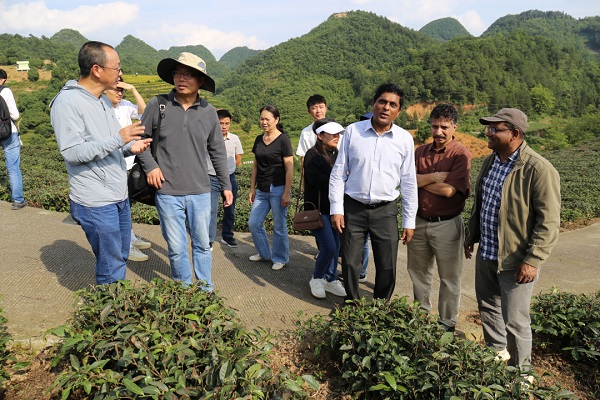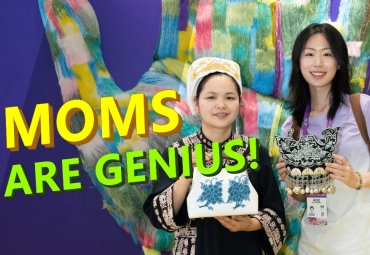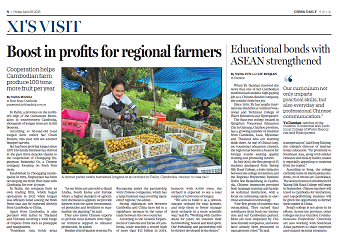Guizhou shares tea planting experience with Sri Lanka

Experts from Sri Lanka learn about Guizhou's green pest control technologies at a tea garden. [Photo/ddcpc website]
A delegation from Sri Lanka recently visited the tea garden in Ziyun Miao and Bouyei autonomous county, Southwest China's Guizhou province.
The delegation, consisting of Keerthi Mohotti, director of the Sri Lanka National Tea Research Institute, Professor Sarath Kodithuwakku, dean of the Agricultural College of Peradeniya University, and other tea experts and students from Sri Lanka, was particularly impressed by Guizhou's environmentally-friendly methods of pest prevention and control.
Many tea gardens around the world are currently suffering from pests such as thrips, leaf beetles, weevils, and black citrus aphids, none of which are found in the tea gardens in Guizhou.
The reason is simple: a liquid containing entomopathogenic nematodes – natural enemies of pests – has been sprayed on the soil. Once the nematodes enter the soil, they will consume pests, reducing the harm caused by thrips, leaf beetles, and weevils. When there are no pests to eliminate, the nematodes die naturally, posing no harm to humans, livestock, crops, or the environment.
A variety of nectar plants such as cosmos, marigolds, Mexican sage, and clover are intercropped at the tea garden, not only suppressing weeds but also attracting pests such as thrips to provide breeding space for the nematodes, which can also improve soil quality and fertility.
With a focus on ecology, agronomy, and biological control, Guizhou has abandoned the use of glyphosate.
Professor Hao Gefei from the national key laboratory of green pesticides said that the laboratory has been cooperating with institutions such as Peradeniya University in Sri Lanka for eight years, focusing on the requirements for green pest control technologies targeting harmful organisms in mountainous tea gardens.
They are promoting the construction of a joint laboratory of green pest control technology for tea planting. In the near future, Guizhou's green pest control technology system is expected to be widely promoted in Sri Lanka.
All rights Reserved. 京ICP备13028878号-8







 Overview
Overview Guiyang
Guiyang Guian New Area
Guian New Area Liupanshui
Liupanshui Anshun
Anshun Qianxinan
Qianxinan Qiandongnan
Qiandongnan Qiannan
Qiannan Zunyi
Zunyi Tongren
Tongren Bijie
Bijie Guizhou commits to culture preservation and rural vitalization
Guizhou commits to culture preservation and rural vitalization Guizhou voice at 2025 national two sessions
Guizhou voice at 2025 national two sessions Meet the 'genius moms' at Shenzhen cultural fair
Meet the 'genius moms' at Shenzhen cultural fair 

